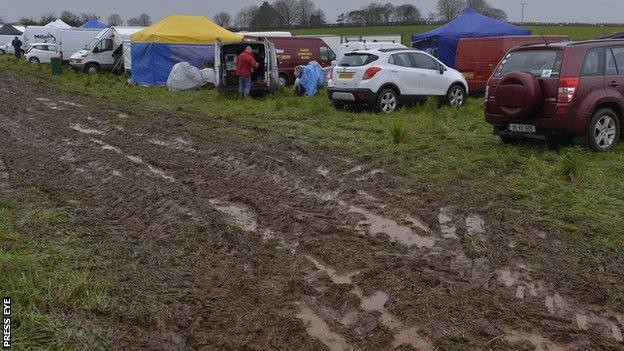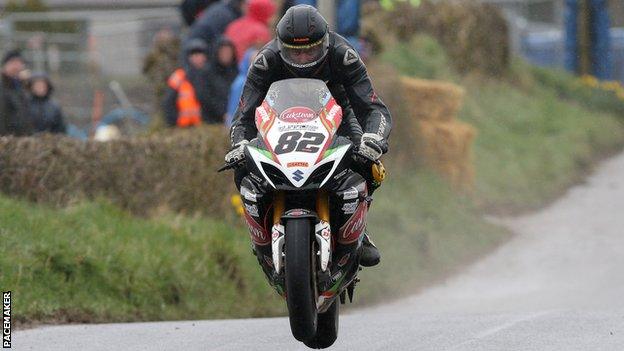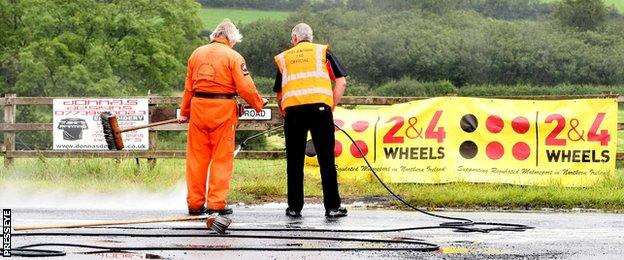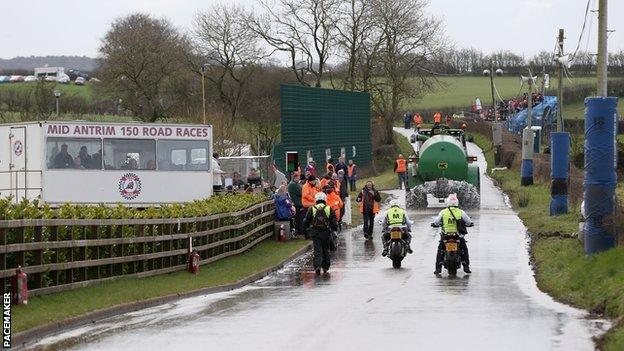Mid Antrim 150: How Irish road racing's 'great survivor' has overcome series of setbacks to return to calendar
- Published

Heavy rain caused the Mid Antrim 150 paddock to become a quagmire in early April 2016
When the Mid Antrim 150 found itself in a literal and financial quagmire in 2016, many thought the latest setback to the road race's fortunes may see the event consigned to the history books.
Heavy rain prior to race day had rendered the paddock at the Clough circuit a virtual bog and kept many fans of the sport away, thereby depriving the organisers of a vital source of income.
This weekend however, against the odds, the meeting returns with a fresh sense of optimism that it may have a bright future and become a permanent annual fixture once again.
While attempts continue to revive the famous Ulster Grand Prix international road race and other events such as the Temple 100, Carrowdore 100, Bush and Enniskillen races have fallen by the wayside, the Mid Antrim has overcome a number of challenges over the years to restore its place on the road racing calendar.
The alleged sabotage of the event by the deliberate placing of oil slicks around the circuit, financial woes, the loss of key riders, politics within the sport, the impact of Covid-19 - the recent history of Irish road racing's 'great survivor' has it all.

Dublin native Derek Sheils won the feature Grand Final race when the meeting was last staged in 2016
Internal politicking
During the mid-2000s the event played host to some of the best racers - and best racing - to be seen at any public roads circuit in Ireland.
Riders of the calibre of Guy Martin, Cameron Donald, Conor Cummins, Ryan Farquhar, Adrian Archibald, Michael Dunlop and William Dunlop, plus Martin Finnegan, Darran Lindsay and Richard Britton - the latter three all later tragically losing their lives in racing accidents - graced the 3.5-mile course in county Antrim, producing some exhilarating action.
The future of the race was thrown into doubt however in November 2007 with the resignation of race official and clerk-of-the-course Norman Gordon, who also stepped down from the Ulster Centre of the Motorcycle Union of Ireland (MCUI), highlighting a number of issues, including aspects of health and safety regulations.
Subsequently, having failed to resolve its differences with the MCUI, the motorcycle section of the Mid Antrim Club Committee unanimously agreed not to stage any tarmac events in 2008, a decision that was upheld, external by the Council of the club.
Interested parties had been seeking to run the event, their efforts spearheaded by former clerk of the course Jack Agnew.
Agnew indicated at the time that he was "very disappointed and frankly disgusted by the whole thing" as the dispute between the organisers and the sport's governing body put pay to the running of the event in 2008.
Dispute with Dunlops
The Mid Antrim returned in 2009 but the following year the event suffered a blow as crowd-pullers, the Dunlop brothers, Michael and William, indicated they would not compete following a dispute over entry fees.
Clerk-of-the-course Agnew explained that a decision to charge all riders had been taken reluctantly and based on financial considerations as the club had lost £3,000 the previous year as a result of giving riders assistance with entry fees and a change of direction in this regard was needed to help safeguard the future of the event.
The Dunlop brothers had entered but later indicated to the organisers that they would not be taking part, external, with William, who was sadly subsequently killed in an accident at Skerries in 2018, also citing fatigue because of a busy schedule and proximity to the Ulster Grand Prix as reasons for not participating.
Farquhar went on to take a five-timer at the event, a feat the Dungannon rider repeated in 2012 when the organising club experimented with a June date, before reverting back to the traditional August place on the calendar in 2013.
'Strategically placed' oil spill

Efforts are made to clean the Clough circuit of oil and diesel in 2011
In 2011 Agnew said that an oil spill which led to the cancellation of the race had been "strategically placed".
He had arrived on Saturday morning to find much of the course at Clough had been covered and a major clean-up operation ensued.
A mixture of oil and diesel was found on the circuit, the police informed and the event called off at 12:30 BST.
Alleging sabotage, Mr Agnew said on the day that he believed it was "deliberate because of the position it was put on the road.. on the very fast bend.. on the racing line and the braking line".
"I believe that whoever did it knew what they were doing," he said, adding that "the fact that it was done during the night" also heightened suspicion.
"Police said the course was fine at 03:00 BST on Saturday but it was done by 05:00."
It was the second year the race had been affected by oil, although the previous year the damage had not been as severe.
"This confirms that last year was probably deliberate as well," he said at the time.
Leading road racer Farquhar explained that he "couldn't believe the amount of oil poured on the circuit".
"To me, the persons who put the oil down knew exactly where to put it to cause maximum disruption," he said.
Financial difficulties

Poor weather and a resulting poor turnout of spectators blighted the 2016 Mid Antrim meeting
The Mid Antrim did not take place in 2014 and 2105 because of financial reasons but returned in 2016 with an early April date.
The meeting was dogged by inclement weather however, leading to a poor attendance at the event, and a further monetary shortfall as a result.
Despite this, the meeting was memorable for a hat-trick of wins for 20-year-old Malachi Mitchell-Thomas, an achievement made more poignant in retrospect by the fact that the Bolton rider was killed in an incident at the North West 200 the following month.
Financial losses forced a decision not to run the race in 2017, and with the race not being scheduled to take place in 2018, 2019 and 2020 either amid ever growing costs, followed by the further difficulties caused by the Covid-19 pandemic, it looked like the event may have run its course.
However, persistence on the part of the club and the success of their short circuit events, including the Neil and Donny Robinson Memorial meeting, has resulted in the race being resurrected for 2022.
Organisers have signalled that the support of additional sponsors and the continued backing of others has helped put the meeting on a more solid financial footing.
Improvements have been made to the road surface around the track, changes made to the course, a new start-finish area has been introduced and the entry for the 2022 event includes top Republic of Ireland riders Derek Sheils, Michael Sweeney and Mike Browne, plus Ballymoney's Darryl Tweed.
The meeting on 9 and 10 September is set to be the final round of the Ulster and Irish road race championships and a nine-race programme offers a prize fund of almost £14,000.